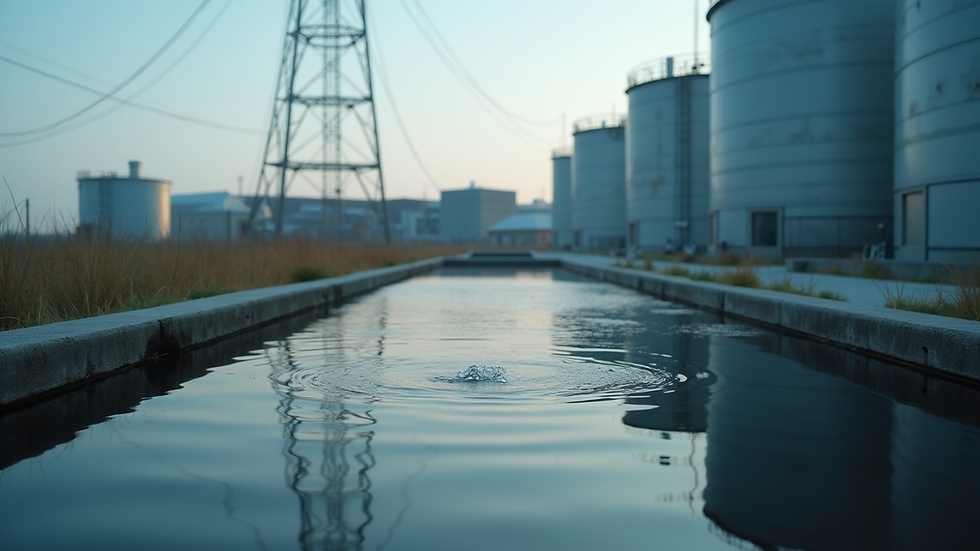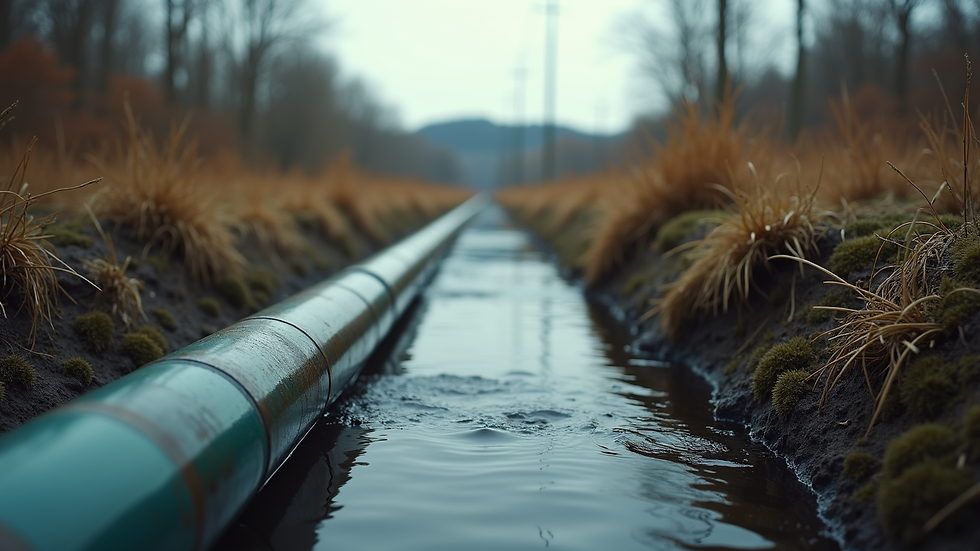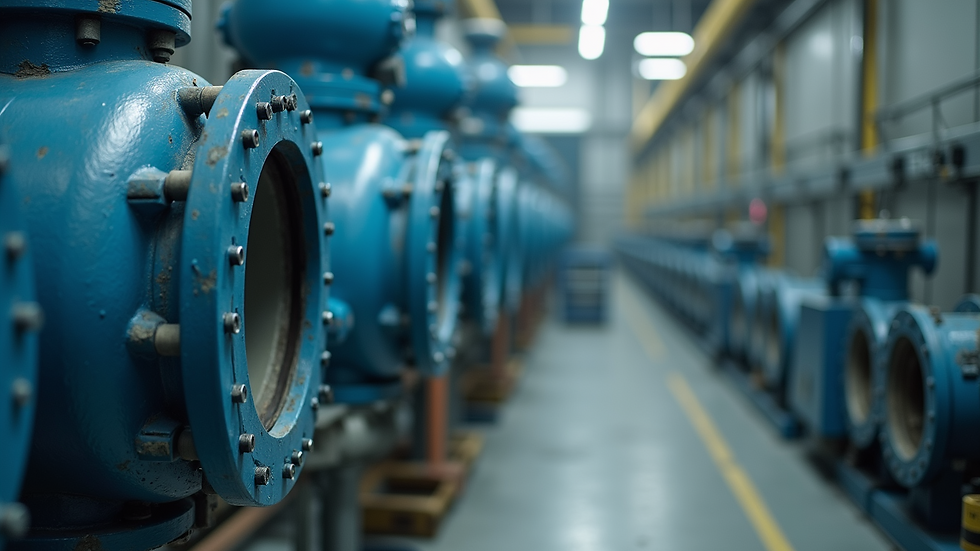Boost Sustainability with Effective Wastewater Solutions
- palwinder kaur
- Aug 28, 2025
- 4 min read
Water is a precious resource, and managing it responsibly is crucial for sustainability. Industries consume vast amounts of water and generate wastewater that can harm the environment if not treated properly. Implementing effective industrial wastewater solutions is essential to reduce pollution, conserve water, and promote sustainable practices. This article explores practical ways to boost sustainability through advanced wastewater treatment methods, focusing on industrial applications.
Understanding Industrial Wastewater Solutions
Industrial wastewater solutions refer to the technologies and processes used to treat water discharged from manufacturing and industrial activities. These solutions aim to remove contaminants, reduce harmful substances, and ensure that the treated water meets environmental standards before being released or reused.
Key Components of Industrial Wastewater Solutions
Pre-treatment: Removing large solids and debris to protect downstream equipment.
Primary treatment: Settling tanks to separate suspended solids.
Secondary treatment: Biological processes to degrade organic matter.
Tertiary treatment: Advanced filtration and chemical treatments to remove remaining pollutants.
Sludge management: Handling and disposal of solid waste generated during treatment.
By integrating these components, industries can significantly reduce their environmental footprint and comply with regulations.

Benefits of Implementing Industrial Wastewater Solutions
Environmental protection: Reduces pollution in rivers, lakes, and groundwater.
Resource conservation: Enables water reuse, reducing freshwater demand.
Cost savings: Lowers water procurement and wastewater discharge fees.
Regulatory compliance: Helps avoid fines and legal issues.
Corporate responsibility: Enhances brand image and stakeholder trust.
What is Industrial Wastewater Pollution?
Industrial wastewater pollution occurs when untreated or inadequately treated water from industrial processes is discharged into the environment. This wastewater often contains hazardous chemicals, heavy metals, organic compounds, and pathogens that can harm ecosystems and human health.
Common Pollutants in Industrial Wastewater
Heavy metals: Lead, mercury, cadmium, and chromium.
Organic chemicals: Solvents, oils, and greases.
Nutrients: Nitrogen and phosphorus causing eutrophication.
Pathogens: Bacteria and viruses from biological waste.
Suspended solids: Particles that reduce water clarity and quality.
Sources of Industrial Wastewater Pollution
Manufacturing plants: Textile, chemical, and pharmaceutical industries.
Food processing: Meat, dairy, and beverage production.
Mining operations: Acid mine drainage and sediment runoff.
Metal finishing: Electroplating and metal cleaning processes.
Addressing these pollutants requires tailored treatment solutions that match the specific characteristics of the wastewater.

Practical Strategies for Boosting Sustainability with Wastewater Solutions
Adopting effective wastewater treatment methods can transform industrial operations into sustainable models. Here are actionable strategies to consider:
1. Invest in Advanced Treatment Technologies
Modern technologies such as membrane filtration, activated carbon adsorption, and advanced oxidation processes can remove complex pollutants more efficiently than traditional methods.
Membrane bioreactors (MBR): Combine biological treatment with membrane filtration for high-quality effluent.
Electrocoagulation: Uses electrical currents to remove heavy metals and suspended solids.
UV disinfection: Kills pathogens without harmful chemicals.
2. Promote Water Reuse and Recycling
Reusing treated wastewater within industrial processes reduces freshwater consumption and lowers discharge volumes.
Use treated water for cooling towers, boiler feedwater, or irrigation.
Implement closed-loop systems to minimize water loss.
Monitor water quality regularly to ensure safety and compliance.
3. Optimize Process Efficiency
Reducing water use at the source decreases wastewater generation.
Upgrade equipment to water-efficient models.
Implement process modifications to minimize water consumption.
Train staff on water conservation practices.
4. Implement Sludge Management Practices
Proper handling of sludge generated during treatment prevents secondary pollution.
Dewater sludge to reduce volume.
Explore beneficial uses such as composting or energy recovery.
Ensure safe disposal according to regulations.
5. Collaborate with Experts
Partnering with wastewater treatment specialists can help design customized solutions that meet specific industrial needs.
For example, companies specializing in industrial wastewater management offer comprehensive services from system design to maintenance, ensuring optimal performance and sustainability.
Regulatory Framework and Compliance
Compliance with environmental regulations is a critical driver for adopting wastewater solutions. Regulations vary by region but generally set limits on pollutant concentrations and discharge volumes.
Key Regulatory Aspects
Permitting: Industries must obtain discharge permits specifying allowable pollutant levels.
Monitoring: Regular sampling and reporting are required to demonstrate compliance.
Penalties: Non-compliance can result in fines, legal action, or shutdowns.
Staying informed about local regulations and investing in compliant treatment systems protects businesses and the environment.

Future Trends in Industrial Wastewater Solutions
The field of wastewater treatment is evolving rapidly, driven by technological innovation and sustainability goals.
Emerging Technologies
Artificial intelligence (AI): For real-time monitoring and process optimization.
Nanotechnology: To enhance pollutant removal efficiency.
Resource recovery: Extracting valuable materials like phosphorus and biogas from wastewater.
Circular Economy Approach
Industries are moving towards circular models where wastewater is not waste but a resource. This approach promotes:
Water reuse and recycling.
Energy generation from sludge.
Recovery of nutrients and raw materials.
Adopting these trends will help industries achieve long-term sustainability and resilience.
Taking Action for a Sustainable Future
Effective industrial wastewater solutions are vital for protecting water resources and supporting sustainable development. By investing in advanced treatment technologies, promoting water reuse, optimizing processes, and complying with regulations, industries can significantly reduce their environmental impact.
Businesses should view wastewater management not just as a regulatory requirement but as an opportunity to innovate and lead in sustainability. Collaborating with experts and staying updated on emerging trends will ensure that industrial operations remain efficient, responsible, and future-ready.
Start your journey towards sustainability today by exploring tailored industrial wastewater management solutions that fit your unique needs and contribute to a healthier planet.



Comments